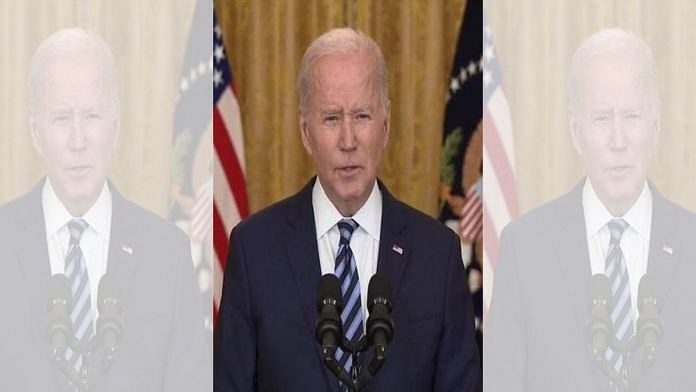New Delhi: US President Joe Biden said Wednesday that India is a key ally in Washington’s Indo-Pacific strategic initiative, even as America made “out-competing China and constraining Russia” its main goal in the country’s 2022 National Security Strategy.
The US 2022 National Security Strategy, which was released Wednesday as America’s response to “tremendous challenges and the unprecedented opportunities” the world has today, said India, being the world’s largest democracy and a ‘Major Defence Partner’, will continue to be a key partner in realising Washington’s vision of a “free and open” Indo-Pacific.
“The 2022 National Security Strategy outlines how my Administration will seize this decisive decade to advance America’s vital interests, position the United States to outmaneuver our geopolitical competitors, tackle shared challenges, and set our world firmly on a path toward a brighter and more hopeful tomorrow,” Biden said Wednesday.
The US also said “out-competing China and constraining Russia” is the main goal of the strategy.
“The People’s Republic of China harbors the intention and, increasingly, the capacity to reshape the international order in favor of one that tilts the global playing field to its benefit, even as the United States remains committed to managing the competition between our countries responsibly.”
He added: “Russia’s brutal and unprovoked war on its neighbor Ukraine has shattered peace in Europe and impacted stability everywhere, and its reckless nuclear threats endanger the global non-proliferation regime.”
Also read: USAF secy needs Pentagon escort but Indian attaché doesn’t — that’s how deep India-US ties are
‘Deepen cooperation with India’
Referring to India as a democracy and a like-minded country, the US National Security Strategy said, New Delhi remains a key partner, from the Indo-Pacific to the Quad.
“We will deepen our cooperation with democracies and other like-minded states. From the Indo-Pacific Quad (Australia, India, Japan, United States) to the U.S.-EU Trade and Technology Council, from AUKUS (Australia, United Kingdom, United States) to I2-U2 (India, Israel, UAE, United States), we are creating a latticework of strong, resilient, and mutually reinforcing relationships that prove democracies can deliver for their people and the world,” it said.
It noted that the Quad, which has addressed regional challenges, will now seek to deepen cybersecurity partnerships and to promoting high standards for infrastructure and health security.
“Our intelligence relationships with our allies are a strategic asset that will increasingly factor in to our competition with our rivals, especially in technological competition,” it added.
‘China has ambitions to create sphere of influence in Indo-Pacific’
The new US security strategy also said that China and Russia are increasingly getting strategically aligned, posing a “challenge” for the world.
“We will prioritize maintaining an enduring competitive edge over the PRC (People’s Republic of China) while constraining a still profoundly dangerous Russia,” it said, adding, “The PRC is the only competitor with both the intent to reshape the international order and, increasingly, the economic, diplomatic, military, and technological power to do it.”
The US also said that China has ambitions to “create an enhanced sphere of influence in the Indo-Pacific and to become the world’s leading power”.
“It is using its technological capacity and increasing influence over international institutions to create more permissive conditions for its own authoritarian model, and to mold global technology use and norms to privilege its interests and values,” it said.
The US’ security strategy also pointed to the fact that Beijing is investing in its military, ”rapidly modernizing” it, and making it “increasingly capable in the Indo-Pacific”, and ensuring it was “growing in strength and reach globally — all while seeking to erode U.S. alliances in the region and around the world”. Washington has charted out a three-pronged strategy to deal with China — to invest, to align and to compete.
Washington has charted out a three-pronged strategy to deal with China — to invest, to align and to compete.
“Competition with the PRC is most pronounced in the Indo-Pacific, but it is also increasingly global. Around the world, the contest to write the rules of the road and shape the relationships that govern global affairs is playing out in every region and across economics, technology, diplomacy, development, security, and global governance,” it said.
Ukraine war ‘profoundly diminished’ Russia’s status
Calling the Russia-Ukraine war as “Putin’s war”, the National Security Strategy said the conflict has “profoundly diminished Russia’s status vis-a-vis China and other Asian powers such as India and Japan”.
It said, “Moscow’s soft power and diplomatic influence have waned, while its efforts to weaponize energy have backfired. The historic global response to Russia’s war against Ukraine sends a resounding message that countries cannot enjoy the benefits of global integration while trampling on the core tenets of the UN Charter.”
It added: “Russia now poses an immediate and persistent threat to international peace and stability. This is not about a struggle between the West and Russia. It is about the fundamental principles of the UN Charter, which Russia is a party to, particularly respect for sovereignty, territorial integrity, and the prohibition against acquiring territory through war.”
The US security strategy highlighted that Russia’s “aggressive behavior has raised geopolitical tensions” also in the Arctic. It said that both Moscow, as well Beijing, are looking to expand their influence in the Arctic region.
“We will uphold U.S. security in the region by improving our maritime domain awareness, communications, disaster response capabilities, and icebreaking capacity to prepare for increased international activity in the region,” the US said.
(Edited by Poulomi Banerjee)
Also read: Engage, engage, engage all sides—why India’s G-20 presidency is good news for world powers



